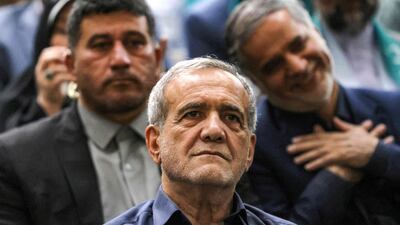Iran’s new President Masoud Pezeshkian, who is set to be sworn in before parliament on Tuesday, must aim to reduce inflation and work on easing the impact of western sanctions to support the economy, analysts have said.
Mr Pezeshkian, 69, was elected as Iran’s ninth president after he defeated hardline candidate Saeed Jalili in snap elections earlier this month.
The election was called after his predecessor Ebrahim Raisi died in a helicopter crash in northern Iran.
Iran's economy has suffered under extraneous sanctions reimposed by Washington in 2018 after former US president Donald Trump removed the US from the Joint Comprehensive Plan of Action nuclear deal that could have provided relief to Tehran in exchange for limiting its nuclear enrichment programme.
The sanctions are yet to be lifted, with current President Joe Biden continuing the policy. The country is also on the FATF blacklist.
The inflation rate in Iran increased to 44.5 per cent in 2023, from 8 per cent in 2017, amid the sanctions, as well as the impact of disruptions caused by the Covid-19 pandemic.
“The main challenge of the Pezeshkian government is to control and reduce the inflation rate,” said Mohammad Farzanegan, professor of Middle East economics at the Centre for Near and Middle Eastern Studies at the Philipps University of Marburg in Germany.
The country’s real gross domestic product is forecast to slow to 3.3 per cent this year and 3.1 per cent in 2025 after growing by 4.7 per cent last year, according to estimates by the International Monetary Fund.
“There are severe limits to what Pezeshkian can achieve on the economic front,” said Hasnain Malik, head of emerging markets strategy at Tellimer, an investment research company in Dubai.
Domestically, he faces challenges because of the “vested interests of the elite of the Revolutionary Guards” and internationally, due to sanctions, Mr Malik said.
The Islamic Revolutionary Guard Corps wield significant influence over Iran’s politics.
The new administration must focus on boosting local economic growth, said Sara Bazoobandi, research fellow at the German Institute for Global and Area Studies.
“Over the past decade, the state has increasingly focused on regional aspiration, and all domestic policies have been focused on political advances, rather than generating growth, employment and improving livelihood in Iran,” she said.
Mr Farzanegan said other areas of priority for the new President must be boosting youth employment, especially among women, and increasing the investment rate.
“Addressing all these challenges requires a higher economic growth rate, for which the lifting of sanctions is a key prerequisite,” he said.

Changing equations
Mr Pezeshkian's appointment comes at a time when Iran is aiming to strengthen trade and economic ties internationally and seeking investment in different sectors, including renewable energy, Reza Ameri, Tehran's ambassador to the UAE, told The National in a recent interview.
“Our neighbouring countries should consider this market for expanding trade,” he said in May.
“In Iran, we are ready to provide any facilities to encourage investment and commercial trade with potential investors and businessmen.”
In May, Iran and the UAE held the first session of their Joint Economic Committee in Abu Dhabi, which was chaired by Minister of Economy Abdulla bin Touq and Iran’s Minister of Roads and Urban Development Mehrdad Bazrpash.
It was the first meeting between the two countries in 10 years, after which they agreed to boost co-operation in sectors including tourism, transport, renewable energy and logistics.
Saudi Arabia and Iran are also looking to improve ties after signing a China-brokered deal in 2023 to re-establish relations after years of tension.
There is great potential for investment in Iran's renewable energy sector, explained Mr Ameri.
The country's Energy Ministry intends to add 10,000 megawatts of energy to its grid by August 2025, Mehr news agency reported in April.
Iran announced in October that the capacity of its renewable power plants had reached 1,088MW.
“Iran, with regard to its geographical location, sunlight … has really good capacity and potential in the field of solar energy production. Moreover, we have good potential for wind energy production,” Mr Ameri said.


